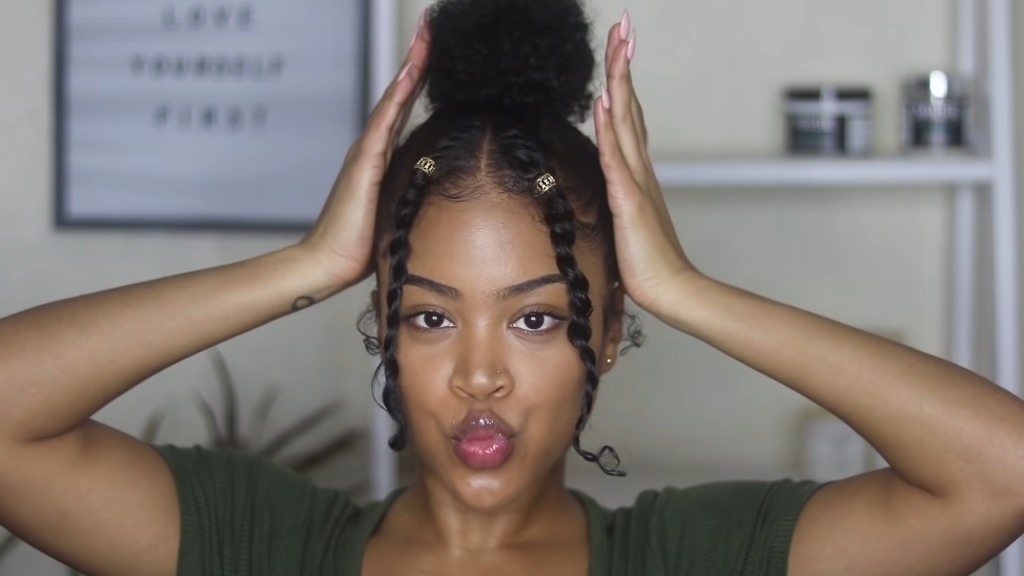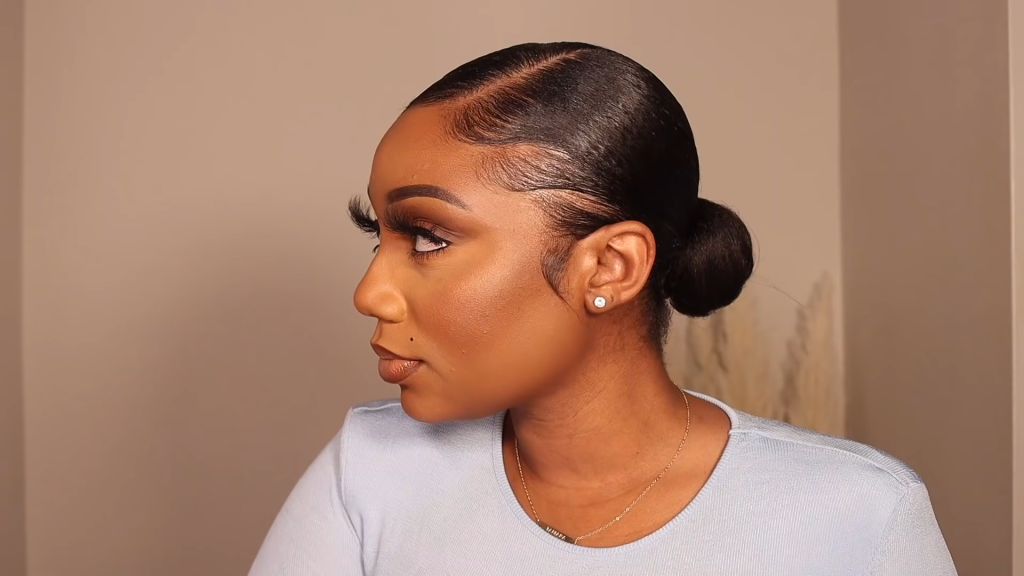Discover the top sulfate-free shampoos specifically formulated for African hair.
The Best Sulfate-Free Shampoos for African Hair
African hair is known for its unique texture and needs. Taking care of African hair requires special attention to ensure it stays healthy and nourished. One critical aspect of hair care is choosing the right shampoo. Sulfate-free shampoos have gained popularity in recent years for their gentle and hydrating properties, making them an excellent choice for African hair. In this article, we will explore the benefits of sulfate-free shampoos for African hair and recommend some of the top options available in the market.

Understanding the Unique Needs of African Hair
African hair has a distinct texture characterized by tight curls or coils. These curls can make it challenging for natural oils to travel from the scalp to the ends of the hair strands, resulting in dry and brittle hair. Additionally, African hair is more prone to breakage and requires extra care to maintain its health and strength.
Understanding the specific needs of African hair is crucial to choosing the right products. This is where sulfate-free shampoos come into the picture.
The Science Behind African Hair Texture
African hair has a flattened or elliptical shape, which contributes to its curly or coily pattern. The unique structure of the hair shaft makes it more delicate and prone to damage. Traditional shampoos containing sulfates can strip the hair of its natural oils, leaving it dry, frizzy, and prone to breakage.
Sulfate-free shampoos, on the other hand, are formulated without harsh cleansing agents like sodium lauryl sulfate (SLS) or sodium laureth sulfate (SLES). Instead, they rely on milder surfactants and natural ingredients to cleanse the hair without stripping away essential oils.
Why Hydration is Key for African Hair
Hydration is essential for maintaining the health and appearance of African hair. Moisture helps to prevent dryness, breakage, and frizz. Sulfate-free shampoos are known for their ability to provide gentle cleansing while retaining the hair’s natural moisture balance. This is particularly beneficial for African hair, which is prone to dryness.
In addition to using sulfate-free shampoos, there are other ways to keep African hair hydrated. Deep conditioning treatments can provide intense moisture and nourishment to the hair. These treatments usually involve applying a thick, hydrating mask to the hair and leaving it on for a certain period of time before rinsing it out. Regular deep conditioning can help to restore and maintain the hair’s moisture levels, leaving it soft, supple, and less prone to breakage.
Another important aspect of maintaining hydration in African hair is avoiding excessive heat styling. Heat from flat irons, curling irons, and blow dryers can strip the hair of its natural moisture, leaving it dry and brittle. It is recommended to limit the use of heat styling tools and to always use a heat protectant spray before applying any heat to the hair. This will help to minimize damage and preserve the hair’s moisture.
Furthermore, incorporating oils into the hair care routine can also contribute to hydration. Natural oils like coconut oil, argan oil, and jojoba oil are known for their moisturizing properties. These oils can be applied to the hair as a pre-shampoo treatment, a leave-in conditioner, or as a finishing touch to add shine and seal in moisture. When choosing oils, it is important to consider the specific needs of the hair and to select oils that are lightweight and easily absorbed.
Overall, understanding the unique needs of African hair and taking steps to provide adequate hydration is essential for maintaining its health and strength. By using sulfate-free shampoos, incorporating deep conditioning treatments, avoiding excessive heat styling, and incorporating oils into the hair care routine, individuals with African hair can achieve and maintain beautiful, hydrated locks.
The Dangers of Sulfates in Shampoos
Sulfates, such as SLS (Sodium Lauryl Sulfate) and SLES (Sodium Laureth Sulfate), are commonly used in shampoos due to their ability to create lather and remove dirt and oil from the hair. However, these harsh cleansing agents can have negative effects on African hair.
How Sulfates Strip Natural Oils
Sulfates are powerful detergents that can strip away the hair’s natural oils, leaving it dry and prone to breakage. This is particularly problematic for African hair, as it already struggles to retain moisture. Without an adequate amount of natural oils, the hair becomes more susceptible to damage from heat styling tools, environmental factors, and even regular brushing.
When the natural oils are stripped away, the hair also loses its ability to maintain its natural shine and smoothness. Instead, it can appear dull, lifeless, and lackluster. The absence of these essential oils also disrupts the hair’s pH balance, leading to an unhealthy scalp environment.
Furthermore, the dryness caused by sulfates can lead to increased frizz and flyaways. African hair, which tends to have a coarser texture, is already prone to frizz due to its natural structure. The use of sulfate-containing shampoos can further exacerbate this issue, making it even more challenging to achieve smooth and well-defined curls or styles.
The Link Between Sulfates and Hair Damage
Sulfates can also cause damage to the hair cuticle, the outer protective layer of the hair shaft. When the cuticle is compromised, the hair becomes more susceptible to breakage, split ends, and environmental damage. African hair, with its already fragile nature, is more prone to these issues.
The damage to the hair cuticle caused by sulfates can lead to increased porosity. This means that the hair strands have a higher ability to absorb and lose moisture. As a result, African hair can become even drier and more prone to breakage, making it challenging to achieve and maintain healthy hair growth.
In addition to the physical damage, sulfates can also cause scalp irritation and inflammation. The harsh nature of these detergents can strip away the scalp’s natural protective barrier, leading to dryness, itchiness, and even dandruff. This can be particularly uncomfortable for individuals with African hair, as the scalp is already more prone to dryness and sensitivity.
Furthermore, sulfates can have a negative impact on hair color. They can strip away artificial hair dyes and cause them to fade more quickly. This can be especially frustrating for individuals who enjoy experimenting with different hair colors or who rely on hair dye to cover gray strands.
Overall, while sulfates may effectively cleanse the hair, they can have detrimental effects on African hair. It is important for individuals with this hair type to seek out sulfate-free shampoos and hair care products that are specifically formulated to address their unique needs. By avoiding sulfates, African hair can maintain its natural moisture, strength, and vitality.
The Benefits of Sulfate-Free Shampoos
Sulfate-free shampoos offer numerous benefits for African hair. They provide gentle cleansing without stripping away natural oils, resulting in softer, more manageable hair. Let’s explore some of the key advantages:
Promoting Healthier Hair Growth
By maintaining the natural moisture balance of the hair, sulfate-free shampoos help to promote healthier hair growth. When the hair is properly hydrated, it is less likely to break and more likely to grow longer and stronger.
Furthermore, sulfate-free shampoos contain ingredients like aloe vera and argan oil, which are known for their nourishing properties. These ingredients penetrate the hair shaft, providing essential nutrients that support hair growth. Regular use of sulfate-free shampoos can improve the overall health of the scalp, creating an optimal environment for hair follicles to thrive.
Retaining Natural Moisture
African hair needs all the moisture it can get. Sulfate-free shampoos help to retain the hair’s natural moisture, preventing dryness, frizz, and breakage. This leads to better hair health and a more vibrant appearance.
In addition to preserving moisture, sulfate-free shampoos also protect the hair from environmental damage. They create a barrier that shields the hair from harmful UV rays, pollution, and harsh weather conditions. This protective layer keeps the hair hydrated and prevents it from becoming brittle and prone to breakage.
Moreover, sulfate-free shampoos are often enriched with natural oils and botanical extracts that provide deep hydration and nourishment. These ingredients, such as coconut oil and shea butter, replenish the hair’s moisture levels, leaving it soft, smooth, and more resistant to damage.
Another benefit of sulfate-free shampoos is that they are gentle on the scalp. Traditional shampoos containing sulfates can cause irritation, dryness, and itching. By using sulfate-free alternatives, individuals with sensitive scalps can avoid discomfort and maintain a healthy scalp environment.
In conclusion, sulfate-free shampoos provide a range of benefits for African hair. From promoting healthier hair growth to retaining natural moisture, these gentle cleansers help to improve the overall health and appearance of the hair. By incorporating sulfate-free shampoos into their hair care routine, individuals can enjoy stronger, more manageable hair with a natural shine.
Top Sulfate-Free Shampoos for African Hair
Now that we understand the benefits of sulfate-free shampoos, let’s take a closer look at some of the top options available in the market:
Detailed Reviews of Each Shampoo
- The Mane Choice Heavenly Halo Herbal Hair Tonic & Soy Milk Deep Hydration Shampoo
- Cantu Sulfate-Free Cleansing Cream Shampoo
- TGIN Moisture Rich Sulfate-Free Shampoo
- Alikay Naturals Moisturizing Black Soap Shampoo
- As I Am Coconut Cowash Cleansing Conditioner
Price and Availability
- The Mane Choice Heavenly Halo Herbal Hair Tonic & Soy Milk Deep Hydration Shampoo – $15.99, available at major retailers and online.
- Cantu Sulfate-Free Cleansing Cream Shampoo – $5.99, available at drugstores and online.
- TGIN Moisture Rich Sulfate-Free Shampoo – $13.99, available at select beauty supply stores and online.
- Alikay Naturals Moisturizing Black Soap Shampoo – $11.99, available at natural hair stores and online.
- As I Am Coconut Cowash Cleansing Conditioner – $8.99, available at beauty supply stores and online.
How to Properly Use Sulfate-Free Shampoos
Using sulfate-free shampoos correctly is essential to reap their full benefits. Here are some tips for washing African hair:
Tips for Washing African Hair
– Wet the hair thoroughly before applying shampoo.
– Use a small amount of sulfate-free shampoo to cleanse the scalp and roots.
– Gently massage the shampoo into the scalp using your fingertips.
– Rinse the hair thoroughly to remove all traces of shampoo.
– Follow up with a moisturizing conditioner to restore hydration.

Maximizing the Benefits of Sulfate-Free Shampoos
– Limit shampooing to no more than twice a week to avoid excessive dryness.
– Use a wide-toothed comb or your fingers to detangle the hair while it is still damp.
– Apply a leave-in conditioner or hair oil to seal in moisture and enhance shine.
– Protect the hair from heat and humidity by using heat protectant sprays or wearing protective styles.
– Choose sulfate-free styling products to maintain the health of your hair in between washes.
In conclusion, sulfate-free shampoos are a game-changer for African hair. They provide gentle cleansing while retaining moisture, promoting healthier hair growth, and preventing dryness and breakage. With the various options available in the market, finding the best sulfate-free shampoo for your African hair is easier than ever. Follow our tips for proper usage and maximize the benefits of these amazing products. Embrace sulfate-free shampoos, and your hair will thank you for it!






[…] shampoos. In this article, we will explore the importance of sulfate-free shampoos, the impact of sulfates on dyed hair, and provide a list of the top 10 sulfate-free shampoos for dyed hair. Additionally, we will offer […]
[…] conclusion, understanding the impact of sulfates on curly hair and the benefits of sulfate-free shampoo is essential for maintaining healthy, vibrant curls. By making the switch to sulfate-free products, […]
[…] the main culprits behind oily hair are sulfates. But what exactly are sulfates? Sulfates are a type of detergent that are commonly found in many […]
[…] Why are Sulfates Harmful to Hair? […]
[…] sulfates can weaken the hair shaft, making it more prone to breakage and damage. This can be particularly problematic for […]